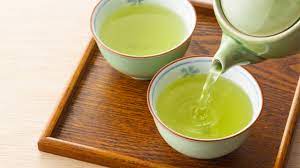
Green tea uses and benefits
- the active ingredient in green tea is polyphenol EGCG [F1]
- it has a positive effect on the development and growth of certain tumors [F1]
- certain cancer cells excessively produce laminin receptors on their surface, to which the polyphenol EGCG binds and acts into the cancer cell [F1]
- protective factors against lung cancer[F6]
- triggers an ongoing series of growth-inhibiting reactions and inhibits the growth of existing cancer tumours,
- inhibits the formation of metastases [F1]
- treatment for rheumatism [F1]
- provides vital vitamin and mineral substances for rheumatics
- can effectively stimulate the metabolism [F3]
- the best source of epigallocatechin gallate (EGCG) and L-Theanine
- contains more than 700 compounds
- EGCG and Theanine are responsible for improving brain health
- EGCG is a powerful antioxidant that can pass through the blood-brain barrier and render free radicals harmless
- also exhibits anti-inflammatory powers, as free radicals can trigger inflammation in the brain, brain aging, memory loss, depression and anxiety
- L-Theanine has significant positive effects on attention, memory, learning ability and related alertness [F4]
- The only dietary sources of L-Theanine are black and green teas [F4]
- regular consumption supports healthy teeth and gums [F5]
- study found a decrease in periodontal gum pocket depth, attachment loss of gums and bleeding – when green tea was consumed every day by the study participants[F5]
Recommended Daily Allowance
Two to three deciliters a day are enough or between 200-300 mL [F1] Two to three deciliters is equal to 8-10 fluid ounces per day.
FIGU Sources
F4: RATG05https://www.futureofmankind.co.uk/Billy_Meier/FIGU_–_Advisory_5
F5: RATG06https://www.futureofmankind.co.uk/Billy_Meier/FIGU_–_Advisory_6
F6: RATG01https://www.futureofmankind.co.uk/Billy_Meier/FIGU_–_Advisory_1